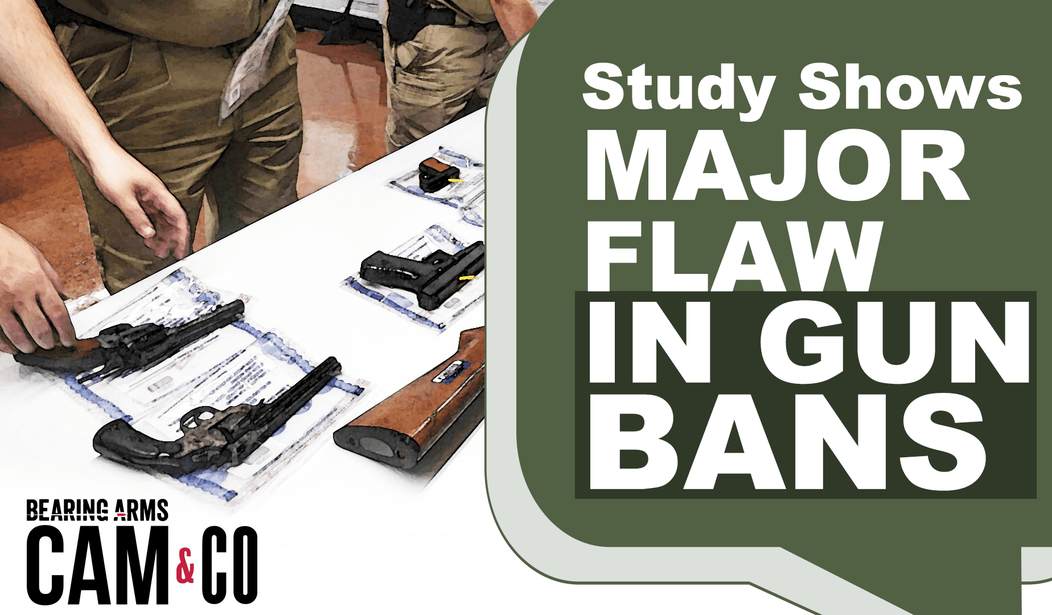Actually, this new study from anti-gun academics in California reveals two big issues with gun bans (beyond the obvious constitutional challenges that come from banning commonly-owned and protected arms); they encourage law breaking and they tend to cause sales of the banned items to actually increase.
Researchers at UC-San Diego (I mistakenly identified the academics as UC-Davis employees on today’s Bearing Arms’ Cam & Co, and I regret the error) took a look at what happened in Massachusetts in 2016, when Attorney General Maura Healey abruptly announced that the state’s ban on so-called assault weapons had been wrongly interpreted since it went into law back in the mid-1990s, and that the law actually applied to almost every semi-automatic rifle sold in the state. Gun store owners were told they could no longer sell any of these guns in their possession, but according to the California researchers, compliance was mixed at best.
In the five business days following Healey’s announcement, sales of semi-automatic rifles soared by more than 500%, though in 2017 the researchers found a 66% decline in sales. The problem is that according to the anti-gun academics, under Healey’s new reading of the old law sales should have been down 100%.
“Our research suggests new firearm restrictions require enforcement to gain full compliance,” said Kenneth C. Wilbur, professor of marketing and analytics at the Rady School and co-author of the study. “If the market complied fully with the Enforcement Notice, then assault rifle sales should have been zero in 2017. The data clearly show that not all firearm sellers and buyers complied with firearm restrictions. In fact, they directly reported their own noncompliance to the state government.”
Considering these buyers and sellers allegedly reported their non-compliance, my guess is that the vast majority of them had no idea that they were violating Healey’s interpretation of the law. But it is true that getting gun owners to comply with new infringements on their Second Amendment rights can be difficult, from the large numbers of New Yorkers who refused to register their guns with the state to the lack of magazines turned over to law enforcement after New Jersey banned the possession of “high capacity” mags that can hold more than ten rounds of ammunition.
How do the researchers propose to deal with that inconvenient fact? Other than that vague talk about the need for enforcement, they don’t really have an answer.
They also don’t have much to offer anti-gun politicians when it comes to another uncomfortable truth for gun ban fans; as soon as those plans become public, interest in the guns themselves tends to dramatically increase.
“The Massachusetts Enforcement Notice was seen as a surprise,” Wilbur said. “Our research suggests that if a politician or a regulatory body wants to restrict weapons, they should design both their policy changes and their communications about their policy changes very carefully.”
He added, “We see a direct correspondence in increased gun sales following mass shootings. Most of that is probably driven by purchaser concern about new weapon restrictions. Manufacturers both benefit from those concerns and actively promote them. Policymakers also need to be proactive in communicating their message on the topic clearly to constituents.”
Now, if you needed any evidence that this study is slanted towards an anti-gun point of view, Wilbur’s assertion, made without a scintilla of evidence, that gun makers actively promote concern about new gun control laws following a mass shooting should do it.
Frankly, gun makers don’t need to say anything. Gun control activists themselves have been using high-profile shootings to demand new bans and restrictions for so long that many Americans reflexively head to their local gun store to purchase a firearm in those circumstances because they know the left will be calling for a crackdown on our constitutional rights. The uncertainty that drives those sales is about whether politicians in Congress or their state legislatures will respond to an act of criminal violence by curtailing our right to keep and bear arms.
While this research may not tell gun owners anything they didn’t already know, I’m guessing that it will come as a bitter disappointment to many gun control activists who sincerely believe that new laws are all that are needed to turn violent criminals into peaceful people and American gun owners into unarmed citizens. Instead, gun bans are likely to be met with civil disobedience and noncompliance, and the announcement of the ban itself tends to spark a surge in sales before it can be implemented.
Not that I expect any of that to change the hearts or minds of the average anti-gunner. But at least they can’t be surprised when their bans fail to touch violent crime or get rid of the guns they’ve declared off-limits to law-abiding citizens.









Join the conversation as a VIP Member